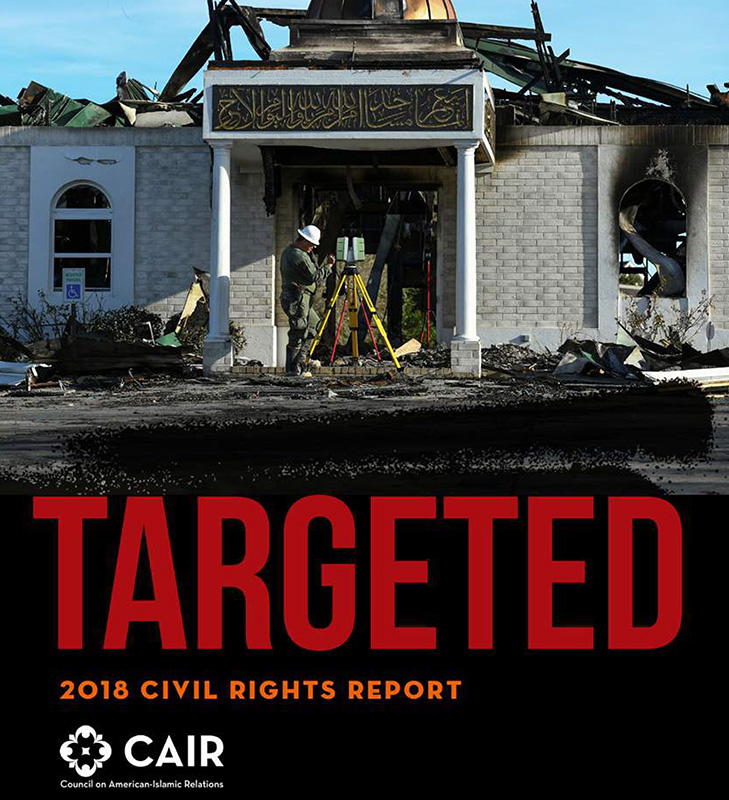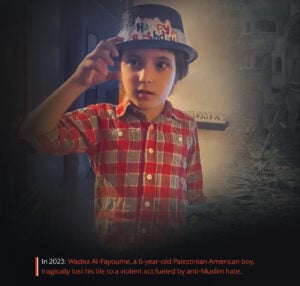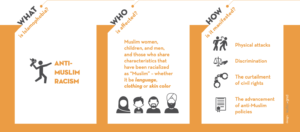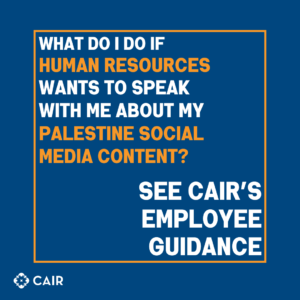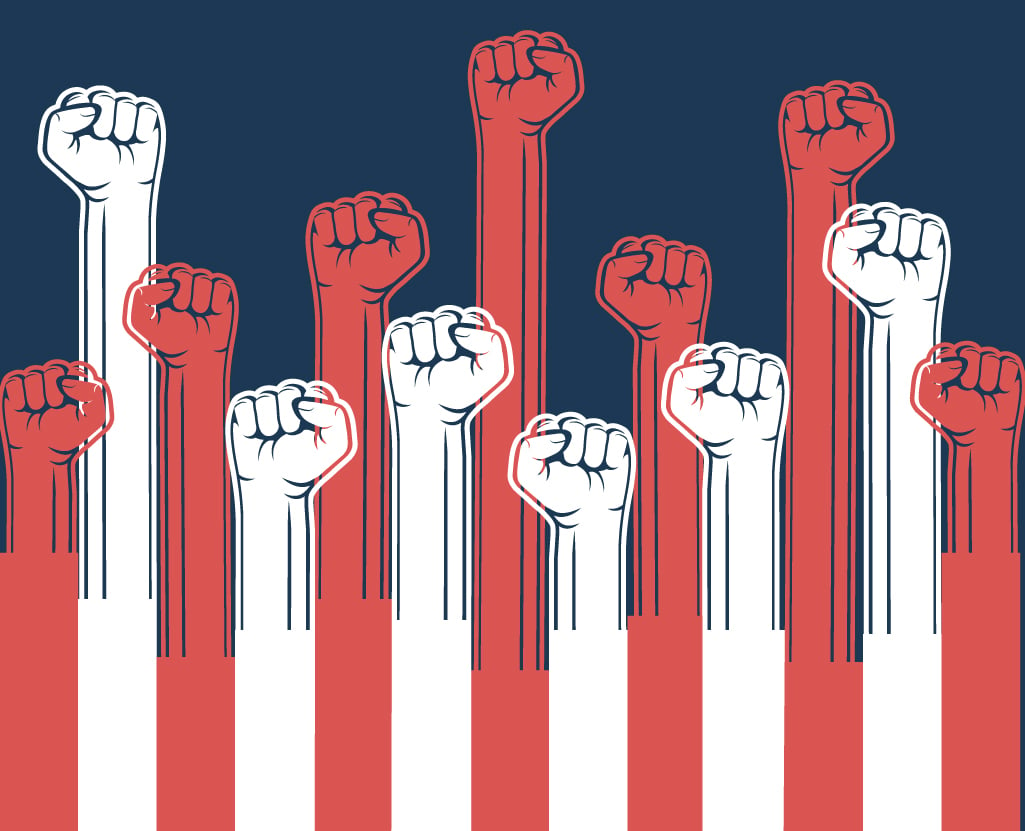Executive Summary
We have witnessed an increase in the onslaught of institutional and individual prejudice against American Muslims in 2017. This report presents the data on, impact of, and legal pushback against anti-Muslim bias in the United States.
Within weeks of his January inauguration, President Trump ordered the first version of the unconstitutional Muslim Ban. The “#NoMuslimBan: Not Now, Not Ever” section of this report examines its origins, content, and trajectory.
Trump’s xenophobic rhetoric, both prior to and during the course of his presidency, emboldened those who sought to express their anti-Muslim bias and provided a veneer of legitimacy to bigotry in the public sphere. “Invoking Trump, Provoking Fear” looks into how the word “Trump” itself has become a potent symbol of wide-ranging racial and religious animus.
While bigotry receives arguably free reign, the government has sought to restrict the right of Americans to free speech on issues of political, social, and economic importance. “Violating the First Amendment” documents the states that have either adopted, or attempted to adopt, legislation, resolutions or executive orders that impose restrictions on the Boycott, Divestment, and Sanctions (BDS) movement.
The fourth section of the report, “The Unconstitutional Terrorist Watchlist,” delves into the decade-long expansion of the unconstitutional federal watchlist system and relates the stories of several impacted American Muslims whose lives have been profoundly disrupted.
Finally, “Key Legal Filings” provides a snapshot of CAIR’s legal pushback against faith-based discrimination in all its forms. It highlights several significant lawsuits advanced on behalf of American Muslims on the unconstitutional Muslim Ban, the unconstitutional federal watchlist, and cases of religious discrimination in employment.
Key Findings
Anti-Muslim bias incidents have continued to increase in 2017. Additionally, a greater percentage of these instances have been violent in nature, targeting American children, youth, and families who are Muslim or perceived to be Muslim.
CAIR recorded a 17 percent increase in anti-Muslim bias incidents nationwide in 2017 over 2016. This was accompanied by a 15 percent increase in hate crimes targeting American Muslims, including children, youth, and families, over the same period.
Of particular alarm is the fact that federal government agencies instigated 35 percent of all anti-Muslim bias incidents recorded in 2017. This represents an almost unprecedented level of government hostility toward a religious minority within the United States, and is counter to the American value of religious freedom.
Following the executive order barring the entry of individuals from several Muslim-majority countries into the U.S., the first version of which was signed on January 27, 2017, CAIR received a deluge of cases. Over the course of the year, CAIR recorded 464 incidents pertaining to the unconstitutional Muslim Ban. That is a staggering 18 percent of the total number of anti-Muslim bias incidents documented in 2017.
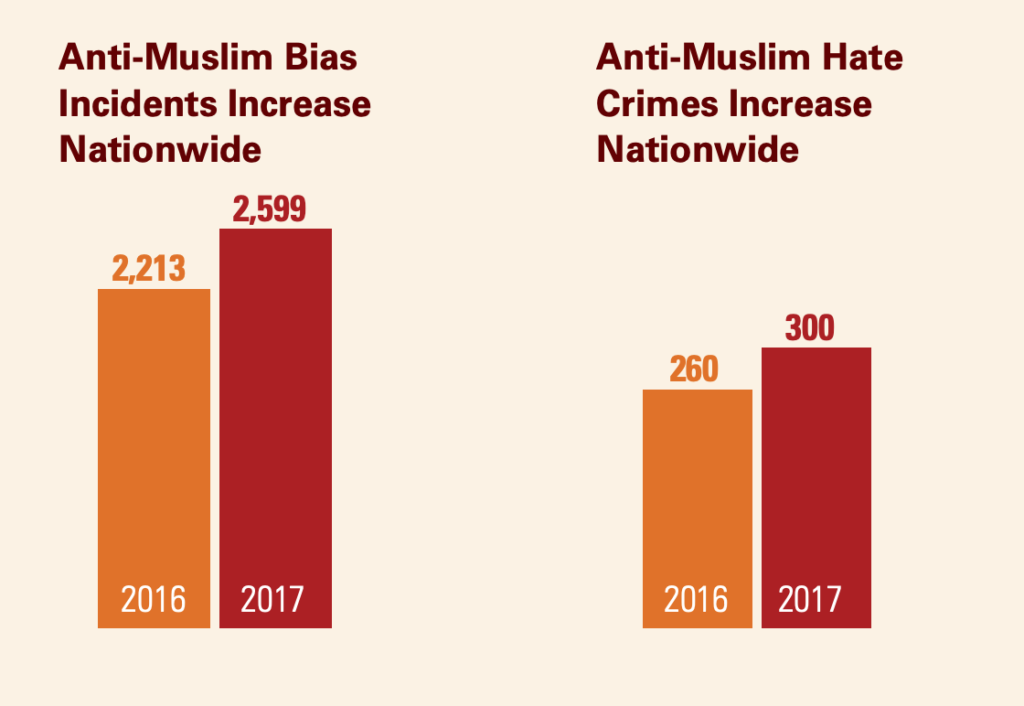
Overall, the top five types of abuse were:
- Harassment, a non-violent or non-threatening incident of bias, at 14 percent of cases.
- Incidents in which the complainant was inappropriately targeted by U.S. Customs and Border Protection accounted for 13 percent.
- Hate crimes, including physical violence targeting individuals and damage targeting property, making up 12 percent.
- Cases in which the FBI harassed or otherwise inappropriately targeted the complainant, constituting 10 percent.
- Employment discrimination — including denial of work, being passed over for promotion, or harassment by a supervisor or other senior staff — accounting for 9 percent. Additionally, CAIR recorded 144 anti-mosque incidents, including harassment, intimidation, and hate crimes.
Background, Methodology, and Limitations
Background
From 1995 to 2009, CAIR published an annual report on the status of civil rights for Muslims in the United States. After a brief hiatus, during which the organization invested significant resources to improve human resources and case intake, investigation, management, and classification, the annual report was relaunched in 2017.
Targeted is thus the second annual report following the release of the 2017 Civil Rights Report, The Empowerment of Hate. It provides both hard numbers and real stories of the lives of American Muslims, functioning as a document reflective of the status of American Muslim civil rights over time.
Methodology
Each year, thousands of Americans contact CAIR through a variety of media, including telephone, email, the online complaint system, and CAIR’s mobile app. When possible, CAIR staff also may also reach out to offer their services to individuals whose incidents were reported in news sources and not directly to CAIR.
With each case, civil rights staffers review preliminary materials and conduct extensive interviews with prospective clients as part of the confidential intake process. After gathering adequate information to determine whether a case contains an identifiable element of religious, ethnic, or national origin bias, CAIR staffers strip the case of any confidential and identifying information. This information remains in their independent case management system, and the incident is entered into the national bias incident database.
Launched in 2014, this database is used by all CAIR chapters to chart incidents of religious discrimination as they occur across the country. Prior to gaining access to the system, staffers complete training on case categorization and data entry. To add a new entry, staff specify the state in which the incident occurred, its date, and whether there was an apparent element of religious discrimination. If the latter is marked, the form expands for the staffer to categorize the case based on a number of data points including the type of abuse the complainant experienced, the location of the incident, the precipitating factor that led to it, and so on.
Numerous cases contain elements of many of these factors and staff is therefore trained to only select the representative issues which best describe the complaint. Where appropriate, basic biographical information pertaining to the complainant has also been collected starting in 2017.
In addition to direct intake via legal staff, CAIR also monitors local and national news sources and media reports to collect incidents of anti-Muslim bias. Each external report is fact-checked, verified by a third party, and vetted to exclude false cases or those which are found to have no discernible element of religious discrimination. To prevent duplicate case entry, each incident culled from the media is cross-checked with the appropriate CAIR chapter prior to its entry into the national database.
Thousands of cases have gone through CAIR’s system in the past few years. Irrespective of the fact that not all cases contain evidence of religious discrimination, each case still passes through the investigative stage in order to determine whether CAIR is able to assist the complainant. Assistance can include referral to an appropriate government agency, community organization, or private attorney, in addition to directing the complainant to information relevant to their issue. In effect, this means that each case fed through the preliminary intake and categorization process requires a minimum of three to four hours of staff time to address, regardless of whether it is actionable. Therefore, it is conclusive that any case listed in this report as containing an element of religious discrimination has undergone a thorough vetting process which seeks to ensure the highest possible form of accuracy.
Limitations
This report contains a mere snapshot of the experiences of American Muslims, including children, youth, and families, across the United States. From experience, CAIR knows that bias incidents targeting the community are vastly underreported to both law enforcement and community institutions.
Community members will often not report incidents, such as harassment and bullying, because of a certain level of desensitization. CAIR staff often hear of episodes in which individuals are harassed and do not report the incident because the target feels that either nothing can be done, or that such treatment is expected and normal, and does not necessitate an official complaint.
Where CAIR is present, the local community is more likely to report cases to the organization. Thus, in states like California and Florida where CAIR has multiple offices, a higher numbers of cases are expected than in states like Tennessee or Montana where the organization does not yet have an office.
Bias Incident Data
CAIR recorded a 17 percent increase in anti-Muslim bias incidents nationwide in 2017 over 2016. This was accompanied by a 15 percent increase in hate crimes targeting American Muslims over the same period.
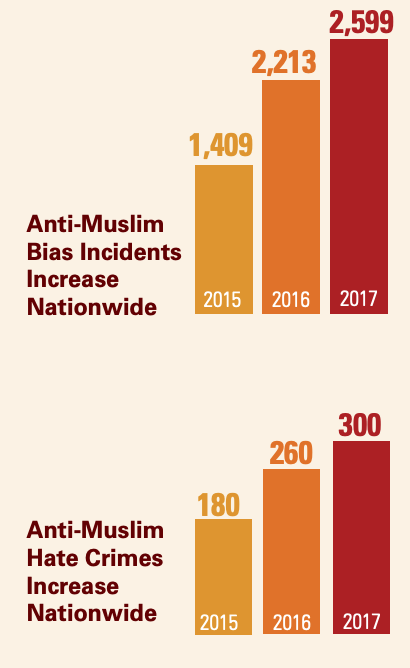
This data demonstrates that not only has the number of incidents targeting American Muslims, including children, youth, and families, risen, but that the incidents are also increasingly violent in nature.
In total, CAIR received 5,650 reports of potential bias incidents cases in 2017. Staff determined that 2,599 (46%) of these reports contained an identifiable element of religious, ethnic, or national origin bias.
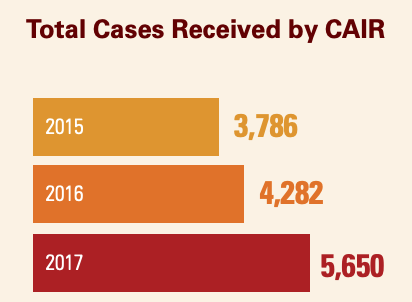
All cases are classified by three criteria in CAIR’s database: type of abuse, location, and triggering factor.
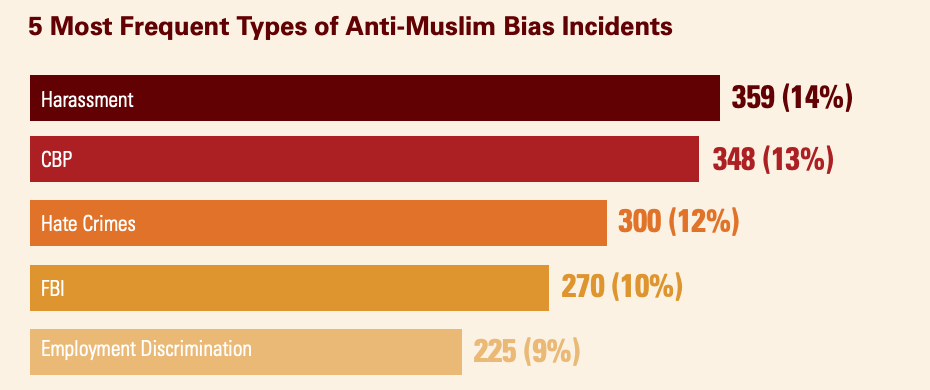
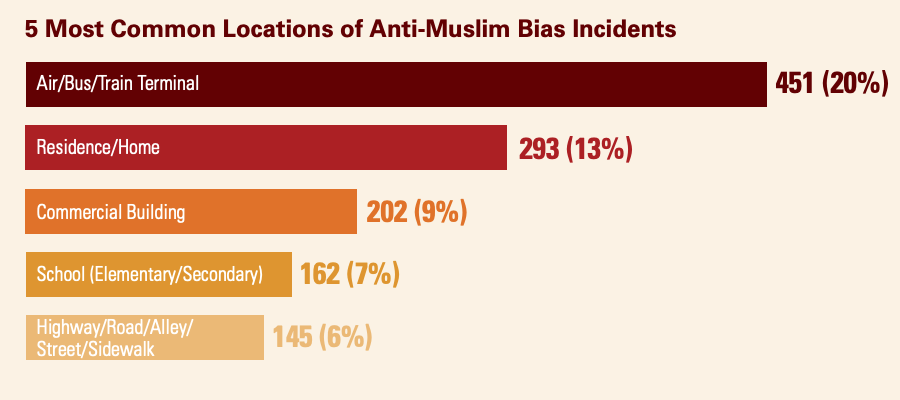
Types of Abuse
Harassment, defined as a non-violent or non-threatening incident, accounted for 14 percent of the total number of anti-Muslim bias incidents, making it the number-one type of abuse.
Incidents in which the complainant was inappropriately targeted and harassed by Customs and Border Protection were the second most frequent type of abuse and constituted 13 percent of cases. This is the first time that CBP has ranked within the top five and it is possible to attribute this to the unconstitutional Muslim Ban executive order.
Anti-Muslim hate crimes, including those targeting children and families, made up 12 percent of cases. The category includes a violent attack against a person, damage, destruction, or vandalism targeting property, or any incident classified as a hate crime by relevant state or federal laws.
The fourth most frequent type of abuse involved incidents in which the FBI harassed or otherwise inappropriately targeted the individual. This constituted 10 percent of the total.
Employment discrimination — including denial of work, being passed over for promotion, or harassment by a supervisor or other senior staff — was the fourth-largest category, accounting for 9 percent of the total. Cases involving discrimination at the workplace continue to remain in the top five types of abuse since 2014.
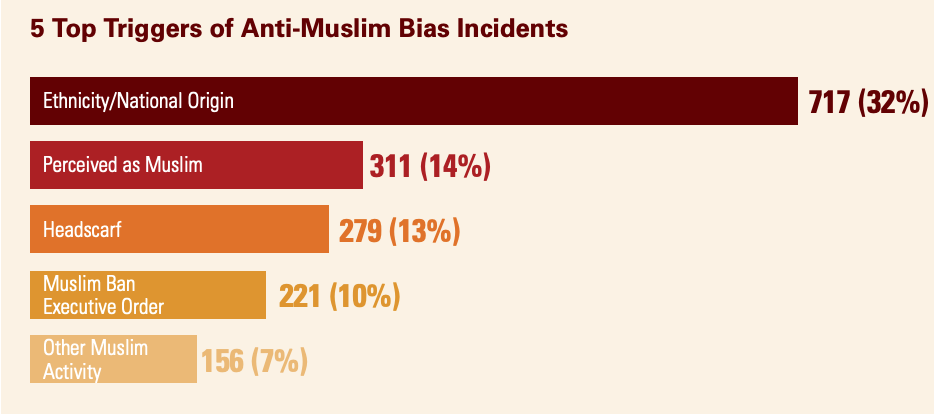
Location
Due in large part to the unconstitutional Muslim Ban executive order, the most common location for an incident of anti-Muslim bias in 2017 was an air, bus, or train terminal, accounting for 20 percent of the total.
The second most frequent location was a complainant’s residence or home at 13 percent. Commercial buildings accounted for 9 percent. At 7 and 6 percent respectively, elementary and secondary schools and highways, roads, alleys, streets, or sidewalks constituted the fourth and fifth most common locations for an incident of anti-Muslim bias.
Trigger Factor
In line with the previous three years, the most prevalent trigger of an anti-Muslim bias incident in 2017 was the victim’s ethnicity or national origin. It accounted for 32 percent of the total.
The second most frequent trigger was the perpetrator’s perception of an individual as a Muslim — irrespective of the presence or not of an identifying marker such as attire. This constituted 14 percent.
The trigger in 13 percent of incidents was a headscarf on a woman. The unconstitutional Muslim Ban executive order made up the fourth most frequent trigger at 10 percent. Other everyday Muslim community and family activities — events such as rallies, picnics, or a day at the state capitol visiting legislators organized primarily for American Muslim families and children — constituted an additional 7 percent.
Government Agency-Instigated Incidents
Federal government agencies instigated 35 percent of all anti-Muslim bias incidents recorded in 2017. Of the 919 incidents, CBP accounted for 38 percent, FBI accounted for 29 percent, TSA accounted for 8 percent, USCIS accounted for 5 percent, and ICE accounted for 4 percent. In 12 percent of cases, multiple federal government agencies were involved, and other government agencies made up 4 percent.
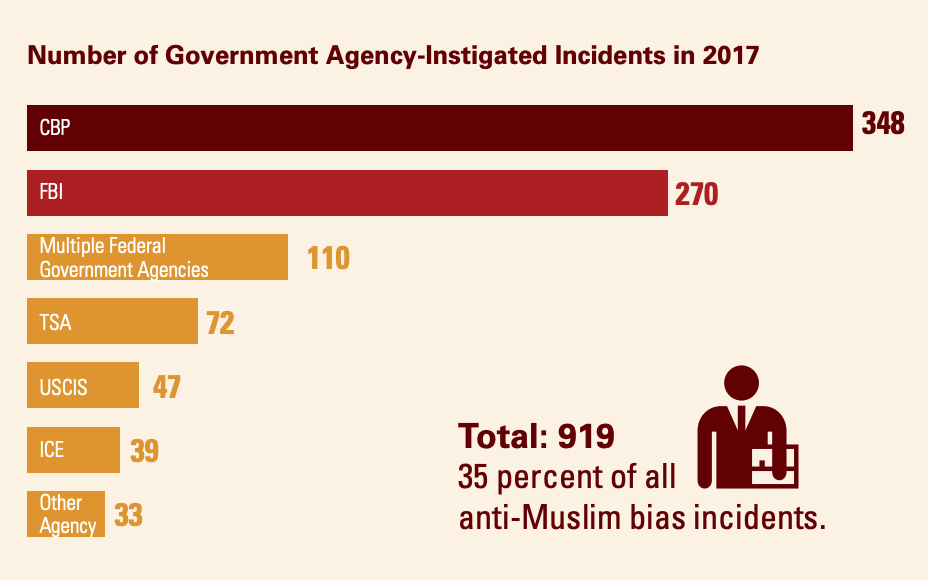
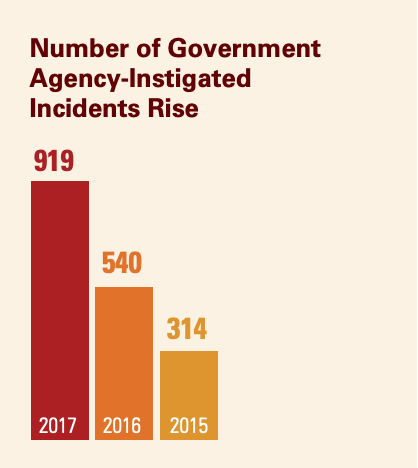
The Unconstitutional Muslim Ban
CAIR received a deluge of cases relating to the unconstitutional executive order barring the entry of families, children, and individuals from several Muslim-majority countries into the U.S., the first version of which was signed on January 27, 2017. In sum, it recorded 464 incidents pertaining to the Ban. This represents 18 percent of the total number of anti-Muslim bias incidents
documented in 2017.
The cases were classified in various ways depending on whether it was CBP, TSA, or other government agencies targeting the individuals. To calculate the total number of cases relating to the unconstitutional Muslim Ban, a simple methodology was employed which compiled cases based on the intersection of type, trigger, and location.
Anti-Mosque Incidents
CAIR recorded 144 anti-mosque incidents in 2017. Of these, hate crimes at a mosque accounted for 57 incidents, intimidation accounted for 42 incidents, and harassment made up 24 incidents.
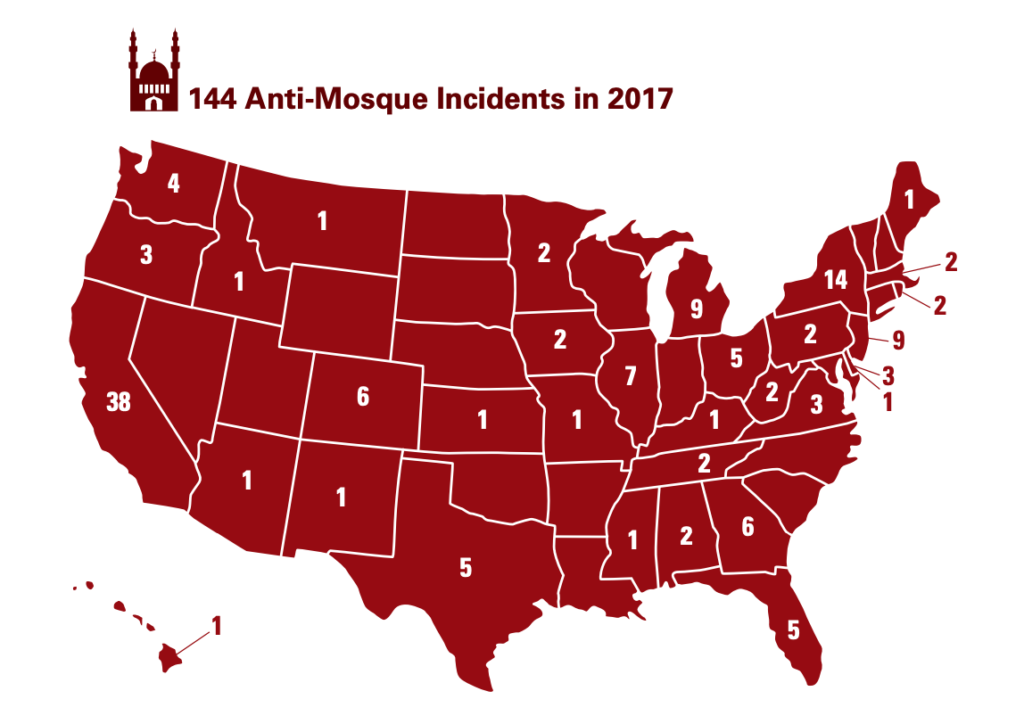
Breakdown of All Documented Anti-Muslim Bias Incidents
Type of Bias Incidents in 2017
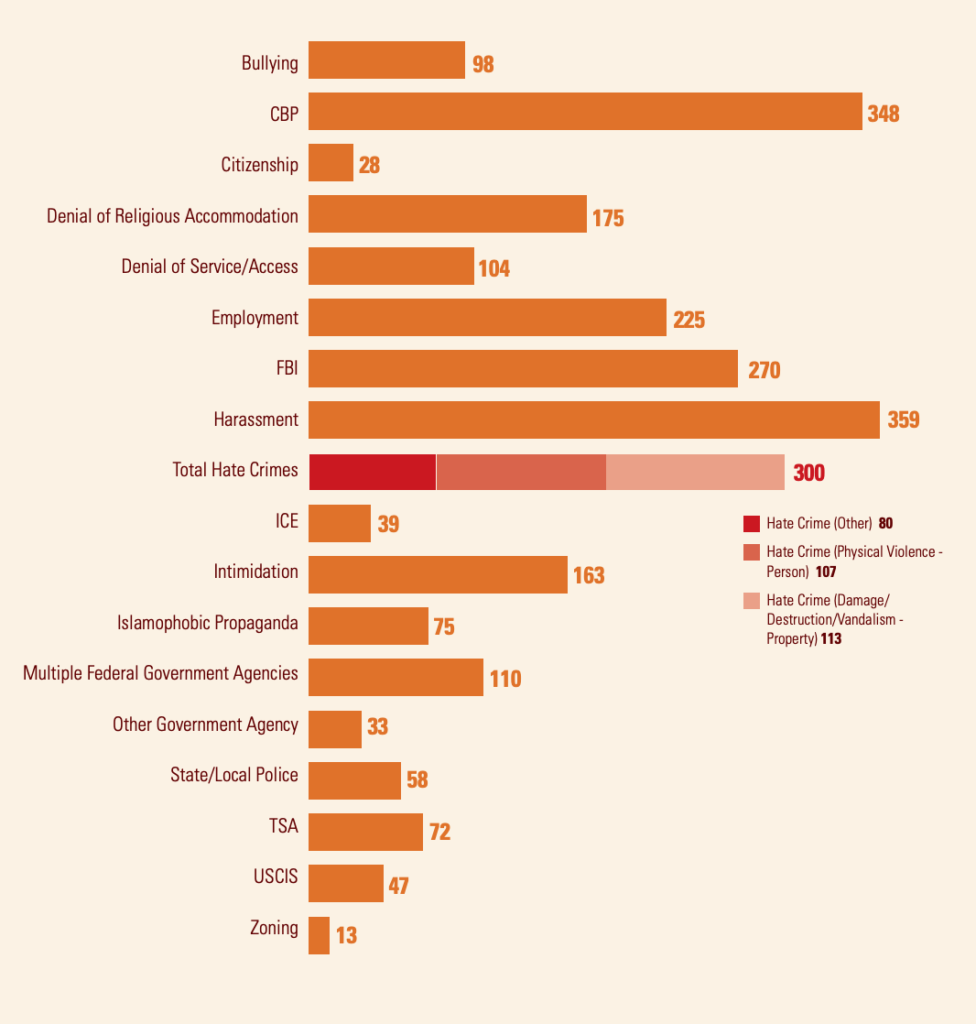
Location of Bias Incidents in 2017
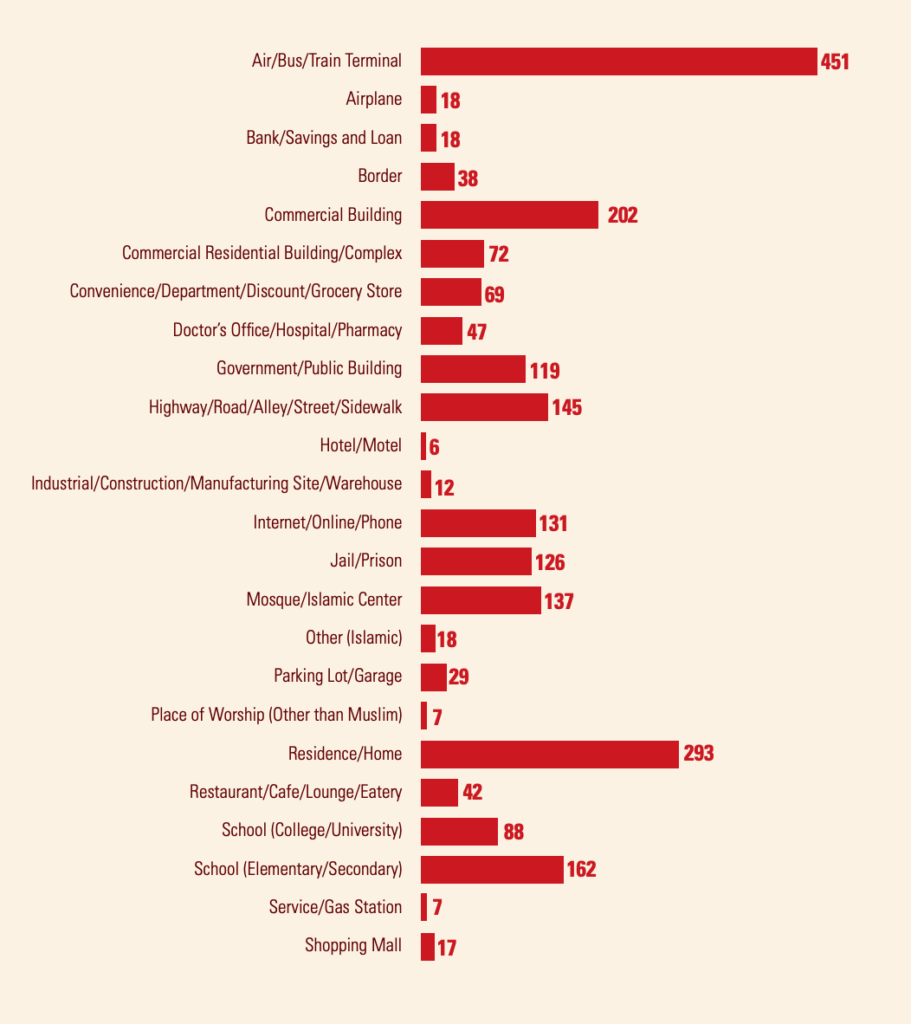
Bias Incident Triggers in 2017
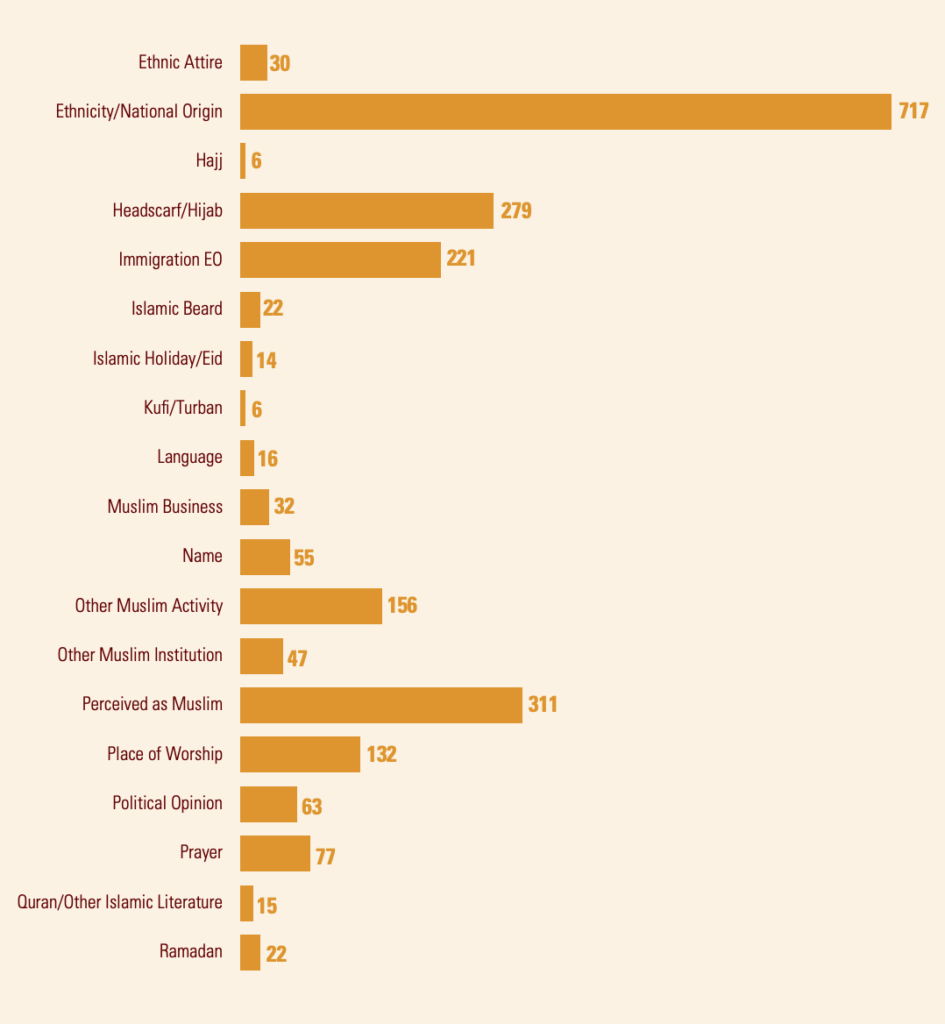
2599 Anti-Muslim Bias Incidents Across the Nation in 2017
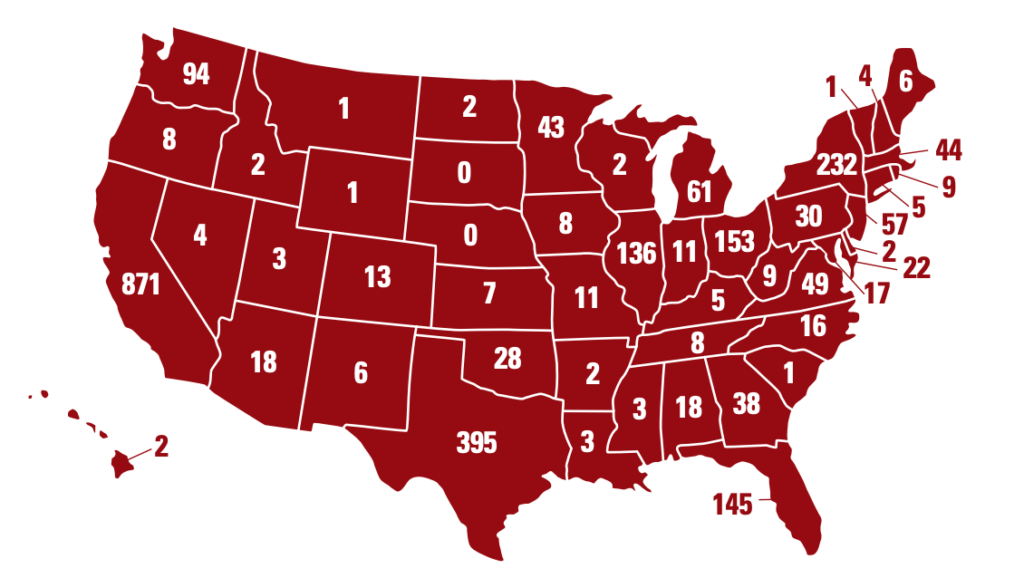
Case Summaries: The Direct Effect of Bias
Examples of the effects of bias on the everyday lives of American Muslims, including children and families, are offered throughout this report. The below case summaries are collected in one section to offer added depth.
Hate Crimes
Massachusetts: A 61-year-old American Muslim grandmother was attacked by a white male while taking a train to prayer services during the sacred Islamic month of Ramadan. Her attacker, almost half her age, screamed at her and punched the window next to where she sat so hard that it broke. As she was leaving the train, he kicked her and stabbed her repeatedly in the back with the end of an umbrella, leaving bruises. The CAIR-Massachusetts chapter located the elderly woman and offered her its services. Though at first she was afraid to pursue the case, she agreed to meet with the prosecutor in the presence of CAIR attorneys. She then agreed to testify before a grand jury on the condition that the CAIR lawyer was present outside the grand jury room. Her attacker was indicted on four felony counts, including two hate crime charges.
Georgia: A man ripped the headscarf off a 14-year-old American Muslim 8th grade girl while yelling “terrorist” at a local mall and then fled. The American Muslim teenager had been walking with a group of people in the parking lot when the stranger approached.
New York: A man instigated an argument with his American Muslim cab driver and threatened him. The passenger pulled out a gun and held it to the driver’s head, calling him a “motherf—ing piece of Muslim sh-t.” He was charged on multiple accounts of felonies.
Kansas: An arsonist burned down an American Muslim couple’s recently opened restaurant, leaving nothing but charred remains inside. Around the back of the building, the couple discovered graffiti that read, “GO BACK.”
Virginia: “It just feels like a nightmare. Just a bad dream and we’re gonna wake up from it,” said an American Muslim couple whose apartment was broken into and vandalized while they were out of state visiting family. They received a call about the break-in and returned home to find “f*** Muslims” written on the wall, their Quran torn to shreds, and all their valuables gone.
Washington: A woman repeatedly banged on the door of her American Muslim neighbors, kicked their cars, and yelled racial slurs at them, including “terrorists” and “drug dealers,” for weeks. She also told them to “Go back to where you belong,” according to court documents. The woman was charged with three accounts of malicious harassment under the state’s hate crime law.
New York: An American Muslim man suffered a broken nose and other injuries after he was beaten by a group of men who had been tracking his movement. The man went into a small electronics store and when he emerged, the men were waiting for him. One of the attackers called him anti-Muslim slurs, like “terrorist” and told him to go back to his country, while the rest of the group pummeled him.
Intimidation
California: Two American Muslims who were cousins were held at gunpoint by an automotive body repair shop employee. The employee made several derogatory comments, including “go back to Afghanistan,” “all you [people] are alike,” and “get out of our country.” He then pulled out a gun and accosted the two American Muslim customers. CAIR’s San Francisco Bay Area office initiated legal action against the shop and bigoted employee for damages incurred by the cousins.
North Carolina: A man parked his pick-up truck beside the car of a headscarf-clad American Muslim mother who was nursing her baby. He glared at her threateningly for several minutes then pulled out a rifle and pointed it directly at her. Fearing for her life, the woman immediately got out of her car and rushed to the closest store.
Minnesota: A man cursed the Prophet Muhammad and threw a pig’s foot at people selling goods at an outdoors farmers market. Muslims are prohibited from consuming pork products and bigots often use pigs or pork in an attempt to offend Muslim sensibilities.
North Dakota: A woman threatened a group of three American Muslim women in the parking lot of a Walmart. She told them to “go home” and that she would kill them. In the video recorded by one of the American Muslim women targeted, the attacker is seen saying, “We’re gonna kill all of ya. We’re gonna kill every one of ya.”
California: A man threatened to shoot an American Muslim woman wearing a headscarf in a public park because she was Muslim. The woman was with her toddler son when the man approached her. After being threatened, she fled from the attacker.
Denial of Service or Access
California: A headscarf-clad American Muslim woman and her husband attempted to enter a retail chain and were discriminated against and denied entry into the establishment. An employee stopped the couple at the door and said the store was closing and the manager was not allowing any more customers inside. However, the store hours indicated that it was open for another twenty minutes. The couple pointed this out, but the employee refused to specifically grant the woman entry. Meanwhile, the employee allowed other patrons to enter. Following the incident, CAIR California’s Los Angeles office served the retail chain with a demand letter detailing the illegality of the discrimination to which its employees had subjected the couple. The chain apologized for the incident and compensated the complainants for the humiliation and distress that was caused by the discriminatory conduct.
Michigan: An American Muslim family had their children taken by Child Protective Services. They requested that the children be placed in an American Muslim family’s home but were told that none were available. The children were instead placed with a strictly practicing Christian family. The American Muslim family was threatened with complete separation from their children if they refused to consent to their children attending church services with the foster family. CAIR-Michigan stepped in and arranged for the children to be placed in a local American Muslim family’s home.
Ohio: The Bureau of Motor Vehicles (BMV) sent letters to 560 immigrants statewide informing them that their Commercial Driver’s Licenses (CDL) would be revoked within 30 days if they could not provide proof of a green card or U.S. citizenship. This caused panic among commercial truck drivers who possessed pending green card applications. A majority of those affected were American Muslims. CAIR-Columbus filed appeals for those affected by the revocations and put pressure on the BMV to reconsider the new regulation. Consequently, the state reversed the decision to revoke licenses and the truck drivers were able to continue to support their families. The city council later recognized CAIR-Columbus with a proclamation for its legal work on this issue.
California: CAIR’s San Francisco Bay Area and San Diego offices settled Department of Fair Employment and Housing complaints on behalf of several American Muslim women and a Sikh man who alleged they were denied access to Go-Kart rides at Boomers! Parks because of their religious headwear. As part of the settlement, parent company Palace Entertainment, LLC, agreed to allow customers who wore securely wrapped headwear to ride the Go-Karts. The company also paid monetary in compensation to each complainant, and will provide anti-discrimination training to employees.
Michigan: An American Muslim businessman was looking to lease a commercial space that would house a car dealership and a Quran school. After several days of negotiations, he returned a signed lease and other required documents to the owner to get his business up and running. When the owner learned that there would be a Quran school on the premises, he stopped communicating with the business man, and eventually refused to lease the building. CAIR-Michigan has filed a Michigan Department of Civil Rights complaint on behalf of the businessman.
Employment
Texas: An American Muslim retail store employee contacted CAIR’s Dallas Fort Worth chapter after her employer refused to accommodate a reasonable religious request. During the Islamic sacred month of Ramadan, the employer did not permit American Muslim employees to take their break at a time that coordinated with the sunset timing for breaking a full-day fast. CAIR-DFW issued a letter to the employer that explained the importance of Ramadan and prayer times in Islam. Upon receipt of the letter, the employer immediately granted the employees’ request for religious accommodation.
Michigan: A supervisor wrongfully targeted an American Muslim city Emergency Medical Services (EMS) worker for discipline. The supervisor was known to possess a hit list of people he was targeting for termination, all of whom were people of color and/or Muslim. The supervisor was also known to post racist, anti-immigrant, Islamophobic, and xenophobic content on social media. CAIR-Michigan filed a civil rights complaint on behalf of the American Muslim EMS worker, and notified the city of the supervisor’s social media postings. This resulted in the supervisor’s termination.
Texas: A young American Muslim woman applied for a job at a Dillard’s located in Garland. After receiving an offer for the position, the department manager informed the woman that she would not be permitted to wear her headscarf while on the sales floor. The woman explained the religious importance of the headscarf but management remained firm in its stance and the position was rescinded. CAIR-DFW assisted the woman, and filed an employment discrimination complaint with the Texas Workforce Commission.
California: The San Francisco Bay Area office of CAIR represented an American Muslim dentist who was prevented from attending Friday congregational prayer services by his employer. The employer claimed that they could not change lunch time on Fridays to accommodate the dentist’s prayer schedule. The manager of the location is alleged to have said, “I have Jews, Seventh Day Adventists, and Christians that work on their sabbath. If you want to work here, that is just the way it is.” No legitimate reason was present for the employer to fail to accommodate the dentist’s request for reasonable accommodation. CAIR is actively litigating the case.
Bullying
California: An American Muslim high school student, who had recently moved to the area with his family, endured almost a year of bullying and a physical assault by another student. He was repeatedly taunted, insulted, and called anti-Muslim slurs, such as “terrorist.” When the matter escalated to physical violence, the student reported the incidents to CAIR-Los Angeles, who then aided the student in filing a formal complaint and navigating the complaint procedures with his school. After conducting a full investigation that involved the school’s campus police, the school expelled the offender. The student is now allowed to study in an environment free from violence and religious intolerance.
Michigan: An American Muslim nursing student was failed out of her program in her last semester due to discriminatory grading and discipline by a professor. The professor frequently made discriminatory comments to the student, including how she would not be successful and how her patients would dislike her because of her accent. He also repeated false and damaging stereotypes about American Muslims and women. After CAIR-Michigan met with the school and notified them of the professor’s actions, the school regranted the student entry into the program.
California: A high school English teacher passed out Fox News articles that demonized American Muslims and spread anti-Muslim conspiracy theories. The materials had been used throughout the entire English department for four years and the administration had not put an end to the practice. One local American Muslim mother spoke to the administration and reached out to CAIR’s San Francisco Bay Area office for support and advocacy. CAIR-SFBA partnered with the Islamic Networks Group to host informative assemblies for the freshman and sophomore classes.
Immigration and Citizenship Delays
Ohio: The U.S. government denied a Muslim man, married to an American Muslim U.S. citizen, an immigrant visa for nine years. During the course of their unusually delayed application process, the couple had four children together and the Muslim applicant missed an opportunity to accept a full scholarship to earn his doctoral degree in psychology at an American university. This caused extreme hardship to his family. The U.S. Consulate refused to provide the couple with any reason for the visa delay, other than to state that it was in “administrative processing.” CAIR Ohio’s Columbus chapter filed a lawsuit against the U.S. Consulate in Jerusalem. Consequently, the Consulate was compelled to grant the man his immigrant visa. In December 2017, he was able to join his wife and children in the U.S. after a nine-year wait.
Texas: A widowed asylum seeker and her four children had an initial interview for asylum in 2013. For several years there was no movement on the processing of their application, though it generally takes only several months for USCIS to issue a decision. After USCIS failed to answer the asylum seeker’s inquiries into the matter, CAIR-DFW stepped in to pressure USCIS to halt its discriminatory delay and adjudicate the case. After an excessively lengthy period of limbo, the Syrian asylum seeker and her family were finally granted asylum in the U.S. in 2017.
California: An American Muslim father was separated from his daughter as a result of the unconstitutional Muslim Ban 3.0. The woman sought legal permanent residence status to join her father, a U.S. citizen. CAIRSan Diego worked with the father to advocate on his daughter’s behalf, and within two weeks the embassy issued the woman an immigrant visa. CAIR-San Diego is currently working on the daughter’s application for certification of U.S. citizenship.
Anti-Mosque Incidents
Minnesota: The Dar Al-Farooq Islamic Center in Bloomington was bombed by anti-Muslim attackers using an improvised explosive device. Fire and smoke surrounded the mosque but there were no reported injuries. The Center serves the city’s community of civically active American Muslim families.
Idaho: A vandal covered a four-foot cross in butchered pig parts and left it at the Islamic Center of Twin Falls. The cross was wrapped in bacon, pig’s feet and a tongue, and was left in the parking lot.
Oregon: Vandals spray painted “ISIS” in large red letters on the walls of the Abu Bakar Islamic Center in Portland.
New Jersey: The Islamic Center of Passaic County received a spate of eight phone calls containing death threats over the course of 24 hours. The callers used profane language and stated they would kill the attendees and “burn [the] mosque down.”
Texas: A violent fire gutted the Victoria Islamic Center. Investigators determined it to be arson. There were no physical injuries or loss of life reported.
#NoMuslimBan: Not Now, Not Ever
A five-year-old boy arrived at the airport with his mother, eager to be reunited with his father who was in the United States. After years of waiting for an immigrant visa, the day had come when his family could finally be together again. But the dream quickly crumbled: the child and his mother were denied boarding their flight because President Trump had just signed the first executive order banning the entry of individuals from several Muslim-majority nations including his place of origin, Yemen. The Muslim Ban, in all three versions enacted through two executive orders and a presidential proclamation, violates the constitution and legalizes discrimination at the institutional and individual levels. It has inflicted lasting and extensive harm that has upended the personal, professional, and academic activities of countless Muslim families, children, and communities around the world, including:
- Prolonged separation of family members
- The loss of First Amendment freedoms — including
religious activity - Significant restraint of travel and freedom of
movement - The promotion of harmful stereotypes of Muslims
- Psychological harm and mental stress
- Subjection to physical violence
False and defamatory portrayals of Islam and Muslims in the public sphere, including in mainstream news and entertainment media, have triggered an increase in anti-Muslim discrimination, violence, and hate speech in the U.S. to an extent never witnessed before.
This section of the report examines the origins, content, and trajectory of the unconstitutional and discriminatory Muslim Ban.
January-March 2017: 1021 Total Bias Incidents; 311 Bias Incidents Related to the Unconstitutional Muslim Ban
Hateful and Islamophobic Origin
The Islamophobic roots of the Muslim Ban are well-documented. In his original dictate for a “complete shutdown of Muslims entering the United States,” Donald Trump cited a defective and inaccurate Center for Security Policy (CSP) poll as justification.19 CSP is an extremist anti-Muslim hate group founded by Frank Gaffney and is a core node of the national Islamophobia Network.20 Gaffney is a conspiracy theorist who, among other ludicrous claims, has accused former President Barack Obama of being a secret Muslim.
Trump repeated his bigoted views on Islam and Muslims in a variety of contexts including print, television, and official statements. In an interview with Fox News the day after Trump signed the first unconstitutional Muslim Ban executive order, former New York City Mayor Rudy Giuliani blatantly admitted that the Muslim Ban was the promised outcome and legal manifestation of Trump’s year-long hateful and bigoted campaign which was fueled, in significant part, by a desire to stigmatize Islam and Muslims.
“Show me the right way to do it legally,” Trump said, according to Giuliani.22 “And what we did was we focused on, instead of religion, danger,” Giuliani continued in his interview. “The areas of the world that create danger for us, which is a factual basis, not a religious basis. Perfectly legal, perfectly sensible.”
In his own words Trump later stated that the facially neutral language of the Muslim ban was merely a pretext for discrimination. “People were so upset when I used the word Muslim. Oh, you can’t use the word Muslims…And I’m OK with that, because I’m talking territory instead of Muslim.”23 Thus, the animosity underlying the ban is clear to see, and the absence of the words “Islam” or “Muslim” does nothing to obscure it. It is also important to recall that there was not a single mention of “Japanese” or “Japanese American” in President Franklin D. Roosevelt’s Executive Order 9066, which resulted in the incarceration of an estimated 117,000 Americans of Japanese descent.
Muslim Ban 1.0
American Muslim parents have been burdened with explaining to their children why their faith has been vilified in official U.S. policy. One Baltimore mother described finding her ten-year-old daughter crying when she went to pick her up from school; a friend told her that she “wasn’t allowed to be friends with people who wear those things on their heads.”
From its very conceptualization, then, the unconstitutional Muslim Ban revealed an illegal, discriminatory intent and effect: to target a religious group behind a façade of national security. Though it did not apply to all Muslims, it did ONLY apply to Muslims. Constitutionally, it violated:
- The Establishment Clause of the First Amendment: Because the purpose and effect was to discriminate on the basis of religion, it imposed upon Islam the stigma of government disfavor. It signaled that Islam is uniquely threatening and dangerous because it was the only religion that was singled out for disfavored treatment.
- The Free Exercise of the First Amendment: It deprived lawfully resident American Muslims originating from the listed Muslim-majority countries their right to free exercise of religion by discriminating against them based on their religious beliefs, and by burdening their right to freely exercise their religious faith.
- Equal Protection under the Fifth Amendment: It deprived lawfully resident American Muslims originating from the listed Muslim-majority countries benefits afforded under the Immigration and Naturalization Act (INA) of 1965 and international human rights laws, such as political asylum. This unfairly and discriminately targeted religious conduct for distinctive treatment.
The anti-Muslim and anti-Islam animus driving the unconstitutional Muslim Ban was further exemplified by the use of coded language within the text of the order itself, which drew on falsehoods and key words and phrases recycled by anti-Muslim bigots in their offensive against Muslim families and children. A few examples will suffice.
First, the executive order drew on the false premise that Muslims specifically “bear hostile attitudes toward [the United States] and its founding principles.” This was evidenced in the President’s numerous Islamophobic statements, such as when he expressed in a CNN interview in March 2016 that “Islam hates us.” When he was asked to distinguish those who commit bad actions, Trump asserted, “you don’t know who is who.”
In another instance in June 2016, Trump accused Muslims of “trying to take over our children and convince them how wonderful ISIS is and how wonderful Islam is.”
Another example of how the rhetoric of the anti-Muslim hate groups infused the document was the use of common anti-Muslim phrases such as, “honor killings,” “violent ideologies over American Law,” and “persecution of those who practice religions different from their own.” These are wholly constructions formed and disseminated by the Islamophobia Network and those who possess a close-minded prejudice against Muslims.
The effect of the order was immediate. It separated mothers from their children, husbands from their wives, and broke families apart solely because of where they were coming from.
A CAIR lawsuit put it well: “Trump’s action[s] are arbitrary and capricious, shock the conscience, violate the decencies of civilized conduct, are so brutal and offensive that they do not comport with the traditional ideas of fair play and decency, lack even a rational relationship to any legitimate government interest, and have substantially burdened and unduly deprived the Plaintiffs and similarly situated Muslims their constitutionally protected rights, including their right to be free from discrimination on the basis of religion, the right to be free from condemnation by the government on the basis of their religion, the right to be free from being singled out by the government or disfavored treatment on the basis of their religion, liberty interests in engaging in international travel and returning home in the U.S., their international human rights, their right to free exercise of religion, and their rights to freedom from false stigmatization.”
What Do Experts and Courts Have to Say About the unconstitutional Muslim Ban:
“Violates the Establishment Clause of the First Amendment.”
“Represents an act of unconstitutional discrimination.”
“Motivated by bias against Muslims.”
Absent “any rational justification for the categorical exclusion of individuals.”
“Discriminates against Muslims and disfavor one religion as compared with others, and endorses one religion as compared with others.”
Singles out Muslims for “harsh legal disabilities and punishments, including exclusion, detention, and expulsion.”
“Intended to favor some religious groups over others.”
“Drips with religious intolerance, animus, and discrimination.”
“Unnecessary” and of “unprecedented scope.”
A “reasonable observer” would conclude that it is motivated principally by “animus towards Muslims.”
“The Proclamation [Muslim Ban 3.0] does not abandon th[e] fundamental approach” of barring entry by people from Muslim-majority countries, “but rather doubles down on it.”
It “plainly discriminates based on nationality in the matter that [is antithetical to] the founding principles of this Nation.”
License for Hostility
Muslim Ban 1.0 also triggered social media scorn against Muslims and Islam. What was unique was the degree to which it was linked to a specific policy adopted by a U.S. administration and fed by the statements of a sitting American president. Social media users utilized the arrival of the Ban as a vehicle to justify their contempt for and attacks against Muslims and Islam.
A common refrain was to denigrate Muslim persons as inherently deviant while embracing the Ban as a protection against that deviance. For example, one user posted the following: “When one says #NoBanNoWall, I imagine they are ok with young children being assaulted by sexually repressed Muslims. #YESbanYESwall.”
Some used the Muslim Ban to advocate for the exclusion of American Muslims: “Hey ho, hey ho, Islam has got to go!” Others heaped scorn on the Muslim community categorically: “…#YesBanYesWall Fuck you and fuck #islam.”
Individuals also used the hashtag #banislam to organize their anti-Muslim postings. One individual “thank[ed] President Trump for keeping us safe” and exclaimed “No Rapefugees!!” Another linked to an article about the unconstitutional Muslim Ban and commented “#banIslam FOREVER.”
Muslim Ban 2.0
Following extensive legal pushback against the unconstitutional Muslim Ban, the president revoked the first executive order and issued Muslim Ban 2.0, which banned entry to the U.S. for individuals from six of the seven original countries. Yet the new order remained discriminatory in both purpose and effect. In fact, prior to its issuance, Senior White House Policy Adviser Stephen Miller said as much in a Fox News interview when he claimed that the revised version would “have the same basic policy outcome.”
One American Muslim physician in Minneapolis described having to respond to false anti-Muslim stereotypes after a patient asked, “Why do you people hate us?” in the weeks following the issuance of Muslim Ban 2.0.
In an attempt to strengthen the facade of national security, the administration also adopted a rhetorical shift when discussing the Muslim Ban. Then Secretary of Homeland Security John Kelly attempted to reframe the order from being a Muslim Ban to one that sought to address “questionable vetting procedures.”
This obfuscation did not work. In its analysis, the Fourth Circuit Appeals Court declared that Muslim Ban 2.0 could not “be divorced from the cohesive narrative linking it to the animus that inspired it.” It was evident that the primary purpose remained to “exclude persons from the United States on the basis of their religious beliefs.” Like the earlier iteration, Muslim Ban 2.0 violated the Establishment Clause of the First Amendment as well as provisions of the INA. The Court described it as an order that “drips with religious intolerance, animus, and discrimination.”
Throughout the duration of the Fourth and Ninth Circuit court cases on the Muslim Ban, Trump tweeted statements such as:
“That’s right, we need a TRAVEL BAN for certain DANGEROUS countries, not some politically correct term that won’t help us protect our people!”
“Radical Islamic Terrorism must be stopped by whatever means necessary! The courts must give us back our protective rights. Have to be tough!”
“We need the Travel Ban as an extra level of safety!”
We “need to be smart and vigilant and tough.”
“I am calling it what we need and what it is, a TRAVEL BAN!”
“The travel ban into the United States should be far larger, tougher and more specific-but stupidly, that would not be politically correct!”
A Bona Fide Relationship
In June, the Supreme Court consolidated the ongoing cases on the Muslim Ban and stated that the order would remain in effect, except for “foreign nationals who have a credible claim of a bona fide relationship with a person or entity in the U.S.” For individuals, the Court explained, this means a “close familial relationship.” The State Department then issued guidance defining “close familial relationship” to exclude grandparents, grandchildren, aunts, uncles, nieces, nephews, cousins, brothers-in-law and sisters-in-law.
This guidance was challenged by the district courts. The Hawaii Court concluded that this was in conflict with the scope of familial relationships recognized in relevant federal immigration statutes, and “represents the antithesis of common sense. Common sense for instance, dictates that close family members be defined to include grandparents. Indeed, grandparents are the epitome of close family members.” It is clear that the only explanation for such an irrational definition of “bona fide” was a desire to keep as many Muslims as possible out of the United States.
Muslim Ban 3.0
On September 24, 2017, the executive order on the unconstitutional Muslim Ban 2.0 expired and Trump issued Muslim Ban 3.0 as a presidential proclamation entitled “Enhancing Vetting Capabilities and Processes for Detecting Attempted Entry Into the United States by Terrorists or Other Public Safety Threats.” This newest iteration indefinitely bars virtually all or some travel to the U.S. from Iran, Libya, Somalia, Syria, Yemen, Chad, North Korea, and Venezuela. Like the previous two iterations, it continues to violate the Establishment Clause and the INA. Unlike them, it is indefinite and potentially permanent.
Like its forebears, the unconstitutional Muslim Ban 3.0 facially invokes national security concerns while operating both by design and in actual effect to disadvantage Muslims. Adding North Korea and a small group of Venezuelan government officials and their families to the mix does not change this. Rather, it is a transparent attempt to add a fig leaf of religious neutrality to the order. In a joint declaration, forty-nine former national security, foreign policy, and intelligence officials have stated that as a national security measure” Muslim Ban 3.0 is in fact “unnecessary” and of “unprecedented scope.
Eblal Zakzok is a professor at Ohio State University who is challenging the unconstitutional Muslim Ban. The Ban separated him and his family, from his daughter Turkie, who is stuck in Turkey.
Dr. Eblal Zakzok is an American who currently resides in Columbus, Ohio. He was a full-time professor in Syria till 2014, when Syrian regime security forces detained, beat, and tortured him for two weeks. Eblal and his family fled to Turkey to escape the horrific civil war and further persecution and torture. In December 2014, while his wife and children remained in Turkey, Eblal came to the U.S. to present a paper at an international conference in Michigan and requested asylum. He was granted asylum and obtained a fellowship at Ohio State University where he now teaches Surveying, Remote Sensing and Geographical Information Systems.
Following his successful asylum application, Eblal’s wife and three of his children were granted asylee benefits in 2016. Shortly thereafter, they traveled to the U.S. to reunite with Eblal. His remaining daughter, Turkie Zakzok, was forced to remain in Turkey because she was over 21 at the time he was granted asylum and therefore did not qualify for derivative asylum benefits. On August 25, 2017, Eblal filed a petition seeking approval for his daughter, Turkie, to immigrate to the United States. The petition is currently still pending with U.S. Citizenship and Immigration Services.
On September 24, 2017, Trump issued Muslim Ban 3.0 which bars all Syrians from entering the U.S. The Ban bars Turkie from obtaining the immigrant visa she has applied for and will prevent her from being able to reunite with her father, mother, and other siblings. Turkie cannot obtain permanent legal residence in Turkey, and is therefore at risk of being returned to Syria, where she could face torture and or death. The enforcement of Muslim Ban 3.0 will deny Eblal and his family the ability to be a regular and immediate part of each other’s lives. Additionally, they will be forced to continue to live with the fear that Turkie will be targeted by criminals in Turkey who specifically target Syrian women.
Looking Ahead
As of the writing of this report, the Supreme Court has yet to rule on the merits of the unconstitutional Muslim Ban, which has separated families, limited constitutional freedoms, and promoted harmful stereotypes about Muslims. The Ban is damaging American communities. To remain true to the shared ideals that hold this nation together, the Supreme Court must permanently strike down the ban, and unequivocally demonstrate that religious freedom and equality are for all.
Recommendations
Individuals
- Demand that elected officials make public statements rejecting the unconstitutional Muslim Ban as a hate-driven policy contrary to American values. Contact your local CAIR chapter at cair.com/chapters to learn how you can amplify existing efforts.
- Request lawmakers in Congress to support and adopt legislation that reverses President Trump’s unconstitutional Muslim Ban executive order and blocks its implementation. Such legislation includes Representative Judy Chu’s (D-CA) and Senator Chris Murphy’s (D-CT) companion bills, H.R. 4271 and S. 1979, in the House and Senate respectively, that block the unconstitutional Muslim Ban by prohibiting use of any funds or fees to implement Executive Order 13780.
- Add your voice to the action alerts generated by CAIR at www.cair.com or other civil rights organizations that demand Congress oppose discriminatory “extreme vetting” measures, visa system changes and visa delays that endanger the ability of immigrants, students, and travelers to come to the U.S.
- Email editors of national media outlets at [email protected], [email protected], and [email protected] voicing your objection to the unconstitutional Muslim Ban as a hate-driven policy contrary to our shared American values.
- Support and attend local and national rallies, meetings, and efforts opposing the unconstitutional Muslim Ban, and supporting DACA, the DREAM Act, Black Lives Matter, and other campaigns and movements for respect and equality. The struggle for dignity is a joint struggle and it is critical to be present in each other’s campaigns for justice.
Elected Officials
- Utilize every opportunity to make public statements rejecting the unconstitutional Muslim Ban as a hate-driven policy contrary to American values, remind fellow Americans of our shared values, and tell stories of the lives, hopes, and dreams of American Muslim families.
- Support and co-sponsor legislation that would undo the Trump Administration’s unconstitutional Muslim Ban executive order and related policies that impact the rights of all travelers, including:
- Companion bills, H.R. 4271 and S. 1979.
- Companion bills, H.R.1006 and S.349, introduced by Representative Pramila Jayapal (D-WA) and Senator Kamala Harris (D-CA) in the House and Senate respectively. The bills guarantee legal counsel to those detained upon entry to the U.S., and clarify the rights of all persons who are held or detained at a port of entry or at any detention facility overseen by CBP or ICE.
- The Freedom of Religion Act of 2017 (H.R. 852) introduced by Representative Don Beyer. This seeks to amend the Immigration and Nationality Act to ensure that non-American citizens are not denied admission or entry into the U.S., or other immigration benefits, because of their religion.
Invoking Trump, Provoking Fear: The Unprecedented Nature of the 45th President as a Symbol of Hate
Few minority communities in the United States, if any, have remained unscathed by hate in the wake of Donald Trump’s inauguration. The above listed expressions of hate target different communities and gleefully invoke Trump’s name as the source of impending violence and discrimination. They are merely three of dozens of such instances gathered by CAIR in 2017.
The 45th president’s brazen display of animosity and prejudice has emboldened individuals seeking to express their bias and made the very word “Trump” an encapsulating and potent symbol of wide-ranging racial and religious animus. Both adults and children have begun to use “Trump” to taunt and harass strangers, colleagues, and classmates.
A young American Muslim student was told that Trump was going to kick the “terrorists” out because all they did was “bomb.”
Vandals spray painted “Trump #1 Whites Only USA,” “Whites #1” and “N***** DIE” on benches and a fence surrounding the Salem State University baseball field.
Pause for a moment and let that sink in: people are invoking the name of a sitting U.S. president — the highest executive office in the nation — as a symbol of hatred and prejudice to inspire fear in racial and religious minorities. This is unprecedented in American history.
A man approached a Muslim family at a Texas beach and launched into an obscene tirade. Among other actions, he screamed, “You’re a f****** Muslim, motherf***” and “Donald Trump will stop you. Donald Trump will stop you!”
Throughout the course of his presidency, and well before it, Trump has hurled dangerous, divisive, and threatening language toward a plethora of American minority groups. He has used his rhetoric to inflame hate and fear among his supporters towards American Muslims, African Americans, Jewish Americans, the Latinx community, refugees, and immigrants, to name but a few.
In August, vandals targeted a predominantly black Baptist church in Texas, scrawling graffiti bearing the word “Trump” and Nazi symbolism.
Hours before the Jewish New Year, vandals spraypainted “TRUMP RULES” and a swastika on a memorial near the Gates of Heaven Synagogue in Madison, Wis.
In addition to his well-documented explicitly bigoted statements, such as calling Mexicans “rapists,” and alleging that “Islam hates us,” Trump has made avid use of well-known racist, white-supremacist, Islamophobic, and xenophobic “dog-whistles.”
For example, Trump tweeted a condemnation of the Diversity Visa Lottery (DVL) program and advocated instead for a “merit based” immigration system following a truck attack in New York, though there was no evidence that the perpetrator had been a part of DVL. The term diversity has “evolved into a bit of white supremacist profanity” and is part of the theory of “white genocide,” which holds that white people are under attack due to immigration and diversity efforts.
In March, vandals attacked a community building in Spokane, Washington, where civil rights groups, including the NAACP, held meetings. One sign portrayed Trump with the caption, “new brooms sweep clean.” Other messages included: “diversity is a code-word for anti-white,” “refugees not welcome,” and one message warning of “white genocide.”
One can find another example of such behavior after the Charlottesville white supremacist rally. Following the altercations between white supremacists and counter protesters, Trump blamed “both sides” and defended the neo-Nazis by saying that they included “some very fine people.” This stance was lauded by former Ku Klux Klan leader David Duke.
As a consequence of his utilization of his political power and platform for this type of signaling, those holding prejudiced, xenophobic, and bigoted views see one of their own in Trump. Ironically, in April of 2017, a white nationalist leader who had assaulted a black woman filed a suit in a federal court, claiming he “acted pursuant to the directives and requests of Donald J. Trump and Donald J. Trump for President,” and therefore, if he was found guilty, the liability “must be shifted to one or both of them.”
A man approached an American Muslim family’s home and began spewing threats, stating “open the door, I want to kill you.” He threw rocks through the windows and later told authorities, “That’s what Trump would do.”
This situation clearly encapsulates how Trump’s behavior has provided an opaque veneer of legitimacy to bigotry, racism, and xenophobia in the public sphere. As author and journalist Ta-Nehisi Coates eloquently put it, “Trump moved racism from the euphemistic and plausibly deniable to the overt and freely claimed.”
These facts are further substantiated through the results of a survey conducted by a group of university researchers to determine the relationship between the fear of threat and Trump. The researchers found that Trump “built a monopoly on threat, and has used it to steel his coalition against anyone who might look different or hold different views.” They further state that this “monopolization of fear” is a “devastating and dangerous political tool.”
In addition to peddling dangerous and dehumanizing rhetoric, the Trump administration has advanced and accelerated discriminatory policies that target the communities towards whom he has expressed animosity and Otherized. This includes the repeal of the Deferred Action for Childhood Arrivals (DACA) program and the imposition of the unconstitutional Muslim Ban.
The confluence of unfair policies and uninhibitedly biased rhetoric is correlated with increases in incidents of aggression and violence toward not only the American Muslim community, as demonstrated in this report, but all communities who are demonized. The drumming up of fear has an immediate and direct impact on the everyday lives of fellow Americans.
A man assaulted a headscarf-wearing American Muslim airline employee at JFK airport in NYC. He shouted “Are you [expletive] sleeping? Are you praying? What are you doing?” before kicking her in the leg. When she escaped her office, he ran after her, got down on his knees and began to bow down, mimicking Muslim prayer. He then shouted, “F*** Islam, f*** ISIS, Trump is here now. He will get rid of all of you. You can ask Germany, Belgium, and France about these kinds of people. You will see what happens.”
To move this country from an atmosphere of fear to an environment of respect, it is important that fair-minded Americans continue to take every opportunity to speak up against hate and injustice.
Recommendations
Individuals:
- Demand that elected officials use their platforms to consistently make public statements reminding fellow Americans of our shared values, and share stories of the lives, hopes, and dreams of American Muslim families.
- Demand elected officials not to provide platforms to anti-Muslim hate groups that promote Islamophobia. This includes their offices’ attendance at hateful events, granting spots during hearings or public forums, and providing meeting spaces that require their sponsorship.
- Call for the resignation of city, state, and federal officials and elected representatives who make anti-Muslim remarks in person or on social media, or who promote Islamophobic or racist emails or memes. Contact your local CAIR chapter at cair.com/chapters to determine how you can amplify existing efforts in this regard.
- Public officials must be held to higher standards when it comes to free speech and challenging hate speech. These individuals are elected, or selected, to serve the public interest of all American families, not just the narrow interests of special interest groups.
- Consider waging public pressure campaigns against hate speech to make sure people know hate speech is not welcome. This can create an environment where the political pressure compels a bigoted public servant to step down or resign. It creates an example of what behavior is acceptable and what isn’t.
- Email editors of national media outlets at [email protected], [email protected], and [email protected] to consistently remind fellow Americans of our shared values.
- Attend and conduct bystander intervention trainings that focus on supporting those targeted by bias incidents and hate crimes either during an altercation or after the fact. Contact your local CAIR chapter at cair.com/chapters for more information on such trainings.
- Reach out to Muslim friends, neighbors, and acquaintances, as well as local Muslim-run organizations, and offer support and encouragement. Volunteer and learn more about the lived experiences of American Muslims.
Elected Officials:
- Utilize every opportunity to remind fellow Americans of our shared values and share stories of the lives, hopes, and dreams of American Muslim families.
- Establish active working relationships with American Muslim organizations, places of worship, and constituents.
- Push for local, state, and federal laws that defeat government initiatives targeting minority groups, and use discretionary authority to advocate for measures that protect the civil rights and liberties of all Americans.
Violating the First Amendment: Government Restrictions on Boycott, Divestment, and Sanctions
A central pillar of a thriving democracy is the right to free speech on issues of political, social, and economic importance. This value is enshrined in the First Amendment of our Constitution and is a integral part of the American ethos. The First Amendment protection extends to the right to boycott, and from 1773, when American colonists boycotted tea in protest of British taxation, to the Montgomery Bus Boycott against racial segregation in 1955, boycotts in support of human and civil rights have held an invaluable place in our nation’s history.
And yet, in 2017, eight states across the country adopted legislation or executive orders restricting the protected First Amendment rights of Americans who participate in the international Boycott, Divestment, Sanctions (BDS) movement. At a federal level, Congress continues its bicameral consideration of the “Israel Anti-Boycott Act,” a law that would effectively criminalize and penalize certain types of free speech on BDS.
Launched in 2005, BDS is an international campaign that applies pressure on Israel to comply with international law and challenges its illegal support for settlements on occupied Palestinian land through an academic, cultural, and economic boycott. The BDS movement’s methods are modeled on the successful movement against South African apartheid.
American citizens and persons in the U.S. have the constitutionally protected First Amendment right to engage in political, social, and economic protest in the form of boycotts, including BDS. Legislation and policy advanced at state and federal levels that seeks to silence these voices is unconstitutional. In 1982, the United States Supreme Court upheld that boycotts which “bring about political, social and economic change” are unquestionably protected by the First Amendment. In NAACP v. Claiborne Hardware Co., the Court ruled that “speech on public issues occupies the highest rung of the hierarchy of First Amendment values, and is entitled to special protection.”
State Restrictions on First Amendment Rights
As support for the BDS movement grows in the U.S., several states have either adopted, or attempted to adopt, legislation, resolutions or executive orders that impose restrictions. This is done through one or more of the following:
- Declaring the BDS movement to be disfavored by the state.
- Declaring that Israel holds a special relationship or status with the state.
- Requiring citizens and companies that wish to conduct any business with the state government to certify that they do not engage in boycotts against Israel or “strategic partners.”
- Creating blacklists of companies that boycott Israel and “Israeli controlled territories.” (This is a reference to unlawfully occupied Palestinian land.)
- Prohibiting the direction of state funds to blacklisted companies.
- Prohibiting investment by public entities in the blacklisted companies.
- Imposing penalties on companies for their support of economic boycotts undertaken by foreign and non-state actors, like the United Nations, with businesses in possession of unlawful settlements on occupied Palestinian land.
- Restricting funds for publicly funded state colleges and universities, and student groups at these institutions, if they support boycotts of foreign countries, like Israel.
These government restrictions are unconstitutional and contrary to American values. The Supreme Court ruled under the “unconstitutional conditions” doctrine that government “may not deny a benefit to a person on a basis that infringes his constitutionally protected interests — especially, his interest in freedom of speech.” Yet that is precisely what these restrictions do.
Additionally, the restrictions counter, undermine, and alienate the increasing number of American businesses, major church denominations, charitable foundations, university student governments, labor unions, and investors who have either vocalized support for BDS or engaged in financial measures against companies and institutions complicit in human rights abuses in Israel.
Local, state, and federal governments should not make determinations about which views constitute acceptable political speech. This toes the line of authoritarianism and is fundamentally counter to the First Amendment-protected right to freely express political views — however controversial or unpopular they may be. Support for such legislative restrictions are wholly un-American and unconstitutional.
Hurricane Aid Tied to Compliance with State Anti-BDS Law
One of the most egregious cases of a government “BDS test” being enforced came in the wake of Hurricane Harvey in Dickerson, Texas. Following the August storm, individuals and business applicants requesting “Hurricane Harvey Repair Grant” state aid to rebuild in Dickerson were required to fill out a form on the city’s website verifying that the applicant:
- “Does not boycott Israel”
- “Will not boycott Israel during the term of this Agreement.”
Dickerson City Mayor Julie Masters defended the anti-BDS hurricane relief aid requirement, citing the state of Texas’ recently passed House Bill 89 that Governor Greg Abbott signed into law in May. The law requires that a Texas “governmental entity may not enter into a contract with a company for goods or services unless the contract contains a written verification from the company that it: (1) does not boycott Israel; and (2) will not boycott Israel during the term of the contract.”
Following public outcry, intense media coverage, threat of lawsuits, and the city’s inability to demonstrate how the provision of hurricane relief aid was tied to entering into a contract for “goods and services,” the verification requirement was ultimately dropped. However, the state law remains.
CAIR and numerous national civil rights groups forcefully reject local, state, or federal government bodies making the receipt of disaster aid conditional on the curtailment of constitutionally protected First Amendment rights. This is nothing less than authoritarian and contrary to our constitution.
Recommendations
Individuals
- In states where such policies have been adopted, work with like-minded people, civil society groups, and elected officials to overturn these measures.
- In states where such policies have not yet been adopted, set up meetings with your elected officials to inform them of the harmful effects these measures have on the right to free speech and boycott.
- Email editors of national media outlets at [email protected], [email protected], and [email protected] to speak out against anti-BDS resolutions, laws, and executive orders. These illegal actions curtail free speech and are contrary to American values.
- Utilize every platform to speak out against unconstitutional nature of anti-BDS resolutions, laws and executive orders. Contact your local CAIR chapter at cair.com/chapters to determine how you can get involved.
Elected Officials
- Utilize every opportunity to make public statements against anti-BDS resolutions, laws, and executive orders.
- Do not restrict the First Amendment protected rights of Americans to engage in any boycott campaign.
- Oppose the introduction and adoption of anti-BDS measures.
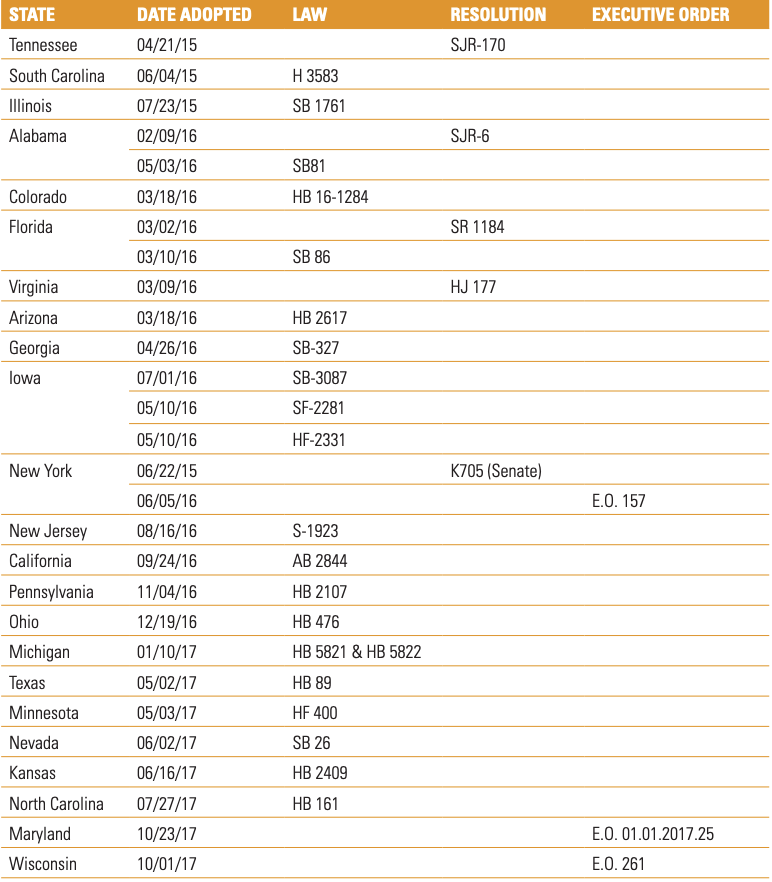
Legal Developments Regarding the Unconstitutional Terrorist Watchlist
Secret laws and executive whim are key ingredients to any form of tyranny. When these are paired with a systematic targeting of minorities, the erosion of civil liberties for everyone is inevitable. This is why the emergence and decade-long expansion of the unconstitutional federal watchlist system is of profound concern, and a core focus of CAIR’s legal and policy work.
Background
In 2003, as a part of the series of sweeping changes that greatly expanded the federal government’s executive authority, President George W. Bush issued an executive order — HSPD-6 — that for the first time in the history of the United States created a single, consolidated watchlisting process. Prior to this, individual agencies possessed rudimentary watchlists with merely a few listed names. There was no bureaucracy dedicated to watchlisting.
The Executive Order changed all of that. The federal government created an entirely new agency, the Terrorist Screening Center (TSC), to implement HPSD-6. The TSC in turn established the Terrorist Screening Database (TSD), which is now commonly known as the terrorist watchlist. Over time, this unconstitutional watchlist has come to include two subsets — the Selectee List, which subjects its listees to invasive screening and questioning, and the No Fly List, which imposes a flight ban on its listees.
These changes enacted by the federal government as a consequence of Bush’s Executive Order enabled the FBI and countless federal law enforcement officials across the country to create an abusive tool not subject to judicial review. The process by which one can be listed is secret and unknown.
Consequently, the unconstitutional watchlist apparatus has become one of the most significant and pervasive examples of anti-Muslim policy. Essentially, officials may anonymously place anyone they choose onto the watchlist, which now collectively contains well over one million names.61 The watchlist primarily ensnares innocent Muslims — both inside the United States and abroad — and is disseminated to other countries around the world.
CAIR’s Challenges to the Watchlist
In its unique role as the nation’s largest Muslim civil rights and advocacy organization, CAIR has provided legal representation and support to more individuals on the unconstitutional watchlist than any other group. It has legally advocated for infants, imams, teenagers, doctors, business owners, truck drivers, and students, among the numerous other innocent Americans who have discovered themselves listed. CAIR’s portfolio of litigation against the unconstitutional watchlist spans federal courts across the country — from Oregon to Virginia and from Florida to Michigan.
In one of its earliest cases, the CAIR legal team represented Gulet Mohamed. In 2010, Gulet — a U.S. citizen — traveled to Somalia to visit his family. However, concerned for his safety, Gulet left Somalia after a few months to go to Yemen and learn Arabic. The situation in Yemen was also risky and so Gulet then traveled to Kuwait to live with his uncle while he studied Arabic.
Two months into his stay, Kuwaiti security agents abducted Gulet and took him to a prison where he was tortured and interrogated. After days of this treatment, his torturers sent Gulet to a deportation facility. However, when officials attempted to deport him, they were unable to because the United States had placed him on the No Fly List.
CAIR immediately sued to allow Gulet to return to the United States. Merely days after the filing, the federal government capitulated and allowed him to fly home. CAIR continued the lawsuit, and after years of litigation, the case has established important legal precedent about the rights jeopardized by the No Fly List. It has also established precedent with regard to the level of scrutiny that federal courts should use when reviewing constitutional challenges brought by citizens on the No Fly List.
For the first time ever, as a result of CAIR’s lawsuit on behalf of Gulet Mohamed, a federal court recognized that the watchlist creates a kind of “second class citizenship,” and that the Constitution requires courts to subject the No Fly List to strict scrutiny — the most robust form of judicial review possible.
Since that first case, CAIR has represented a number of individuals who were tortured as a result of their placement on the watchlist. Additionally, CAIR has developed a firm record for reversing cases of extrajudicial exile. This occurs when the federal government prevents American citizens from returning to the U.S. by placing them on the No Fly List.
In one particularly egregious case, CAIR represented Yussuf Abdi, a U.S. citizen and an imam in Utah who had traveled to Kenya to bring his wife and children—who had just received their green cards—to the U.S. When Imam Yussuf, his wife, and their five children arrived at the airport in Kenya with all their belongings, they were forced to return home upon learning that the U.S. government had placed Imam Yussuf on the No Fly List. This occurred in May 2017, on the eve of the final ten days of Ramadan, the Islamic sacred month of fasting.
Working quickly, CAIR partnered with a local organization, the Refugee Justice Network, and filed suit. Rather than defend the lawsuit, the federal government again immediately capitulated, and allowed Imam Yussuf to return home with his wife and children, and lead his congregation in prayers during the last ten days of Ramadan. To date, CAIR has represented dozens of individuals subject to such extrajudicial exile, and has succeeded in each case in forcing the federal government to allow the people to return home to America.
CAIR’s pushback on the unconstitutional watchlist has thus made a tangible difference for both the targeted individual and the community as a whole. The federal government is aware that innocent Americans who are placed on the watchlist possess a committed advocate that can and will bring a lawsuit and litigate for however long it takes. However, it is critical to work toward making these lawsuits unnecessary. The courts of Congress must prohibit the federal government from placing innocent Americans on a secretive, unconstitutional, and error-prone watchlist.
Terrorist Screening Database – The Unconstitutional Watchlist: The determination of who is placed on the list is made through a secret, undisclosed process. Consequences include: Suffering the danger and indignity of having their own government communicate to government agencies, airlines, state and local law enforcement, foreign governments, gun sellers, car dealers, financial institutions, and courts that they are a menace.
- Selectee List: Subjects its listees to mandatory invasive screening and questioning
- No Fly List: Prohibits listees from boarding commercial flights
Demystifying DHS TRIP
The Department of Homeland Security Traveler Inquiry Program (DHS TRIP) is the administrative complaint process to challenge nominations of American citizens who suspect or know that they have been nominated to the federal terror watchlist. Individuals who seek redress after having been included in the watchlist must submit an inquiry through the DHS TRIP.
Complaints are coordinated with other government agencies, including the TSC, which is responsible for making the determination as to whether any action should be taken on a complaint. TSC has not provided any publicly available information about how it makes those decisions.
Following TSC’s determinations, DHS responds to the individual with a standard form letter that neither confirms nor denies the existence of any watchlist records relating to the individual. These letters neither set forth any basis for inclusion in a watchlist, nor do they state whether the government has resolved the complaint.
CAIR is also critical of DHS TRIP due to its complete lack of due process mechanisms. The government does not provide an American citizen with any opportunity to confront or rebut the grounds for his or her possible inclusion on the watchlist. As such, DHS TRIP offers no meaningful review of the watchlist designation. In effect, it shields the TSC’s actions with respect to nominations onto the list from meaningful review by any independent authority.
Thus, the only “process” available to such individuals is to submit their names and other identifying information to a government entity that has no authority to provide redress, and to hope that an unspecified government agency either corrects an error or changes its mind.
Recommendations
Individuals
- If targeted as a traveler, report the constitutional violation to CAIR at www.cair.com or another legal
organization. - Travelers experiencing difficulties, such as denied or delayed airline boarding, or denied or delayed entry into and exit from the U.S. at a port of entry or border checkpoint should consider submitting a DHS TRIP complaint. To submit a complaint, go to: http://www.dhs.gov/dhs-trip. CAIR notes concerns that some DHS TRIP applicants complain of delays in seeking a resolution and the lack of due process and transparency in refuting government reasoning for placement on the watchlist.
- Contact your member of Congress to demand that the unconstitutional federal watchlist system be fixed. Americans who are wrongly placed on the unconstitutional federal watchlist must be afforded the constitutional right to due process, and the ability to effectively challenge inappropriate designations.
- Email editors of national media outlets at [email protected], [email protected], and [email protected] to speak out against the unconstitutional watchlist as contrary to American values.
Elected Officials
- Utilize every opportunity to make public statements against the unconstitutional watchlist as contrary to American values.
- Congress must investigate and reform the unconstitutional federal watchlist to ensure that Americans who are wrongly placed on the unconstitutional watchlist are afforded the constitutional right to due process and the ability to effectively challenge inappropriate designations.
- This includes that Congress ensure accountability within the watchlist designation procedure, due process, and an appeals process for individuals to challenge erroneous designations. Members of Congress must persistently question NSA, DOJ, FBI, and DHS agency officials responsible for managing the program about these concerns.
- As the watchlist selectively limits the constitutional rights of Americans who are, or appear to be, Muslim, Congress must reject mislabeled and ineffective policies, such as those tying the watchlist to federal background checks.
Key Legal Findings
CAIR litigates against religious discrimination in courts across the country in order to defend and strengthen the civil rights of all Americans. The religious discrimination that CAIR challenges takes many forms, including but not limited to: discriminatory airport screening policies, unconstitutional travel bans that disproportionately affect Muslims, government-led attempts to stigmatize Islam, and hostile workplaces. The legal team’s many lawsuits, brought on behalf of individuals who are targeted by religious discrimination, reflect the unacceptable reality that the equality of Americans who are Muslim in the United States is now facing its greatest challenge ever.
Compiled below are a few of examples of CAIR’s litigation against religious discrimination in all its forms.
The Unconstitutional Muslim Ban
Three days after President Trump signed the first executive order banning people from seven Muslim-majority countries from entering the U.S., CAIR filed its first lawsuit challenging the unconstitutional Muslim Ban. Over the course of the year, as the administration repeatedly repackaged its unconstitutional Muslim Ban, CAIR’s legal team expanded its challenge, filing an additional lawsuit in Maryland and amicus briefs in courts across the country. CAIR’s legal challenge to the Muslim Ban is comprehensive and multi-dimensional.
Sarsour v. Trump
CAIR filed its first and broadest challenge to the first version of the unconstitutional ban, Muslim Ban 1.0, on January 30, 2017, on behalf of non-citizen Muslim students studying in the United States as well as prominent American Muslim leaders and activists. This suit argues:
- The history, context and content of the unconstitutional Ban reveal an illegal purpose and effect to disfavor groups solely based on their religious beliefs.
- The motive is to ban Muslims from certain Muslim-majority countries and to initiate the mass expulsion of American Muslims lawfully residing in the U.S.
- This message of disfavor and stigma has been broadcast to the general public by the Trump Administration and therefore impacts all Muslims in the U.S.
- Constitutionally, the Muslim Ban violates:
- The Establishment Clause of the First Amendment, which states that no religion be singled out for favored or disfavored treatment.
- The Free Exercise of the First Amendment, because it discriminates on the basis of religion and chills the public or private expression of faith by Muslims in America.
- The Due Process and Equal Protection clauses of the Fifth Amendment, because it deprives lawfully residing Muslims the due process of the law, and discriminates based on national origin and religious animus.
STATUS
After the unconstitutional Muslim Ban 1.0 was repackaged as the unconstitutional Muslim Ban 2.0, CAIR maintained its challenge to the Trump Administration’s attempt to exclude more than 100 million Muslims from entering the United States. As of the publication of this report, it is pending before a federal court in Alexandria, Virginia.
Zakzok v. Trump
On September 24, 2017, when the Trump Administration established the unconstitutional Muslim Ban 3.0 via executive action, CAIR and the Brennan Center for Justice filed another lawsuit—this time in Greenbelt, Maryland. The suit was consolidated with other challenges to Muslim Ban 3.0 filed by major civil rights groups. Together, these suits argue:
- This version of the Ban is based on the same religious animus that animated the first two unlawful versions: to keep Muslims out of the United States.
- Adding other nations to the mix does not change this, but rather is a transparent attempt to add a fig leaf of religious neutrality. The impact is and remains overwhelmingly on Muslims.
- Muslims Ban 3.0 exerts concrete harms on American Muslim citizens and permanent residents whose family members are barred from traveling to the U.S.
- Like the earlier versions, Muslim Ban 3.0 violates the Establishment Clause of the First Amendment, which states that no religion be singled out for favored or disfavored treatment.
- The Ban additionally discriminates on the basis of race, nationality, and country of origin, which is a violation of the Immigration and Nationality Act.
STATUS
On December 5, 2017, in a 7-2 decision, the Supreme Court allowed the full scope of Muslim Ban 3.0 to go into effect despite the ongoing legal challenges against it. The final Supreme Court hearing and subsequent ruling on the merits of the case is pending at the time of this report.
The Unconstitutional Federal Watchlist
The unconstitutional federal watchlist, referred to as the “Terrorist Screening Database,” allows the federal government to impose a variety of burdens on the lives of innocent people who have never been arrested, charged, or convicted of a criminal offense. CAIR is aware from experience and leaked federal government documents that officials disproportionately target Muslims, including families and infants, for inclusion on the list. The determination of who is placed is made through a secret, undisclosed process that “requires neither ‘concrete facts’ nor ‘irrefutable evidence.’” Its exact contours are unknown due to its secretive nature, but consequences for American families and children placed on the list include, but are not limited to:
- The inability to fly on airplanes, to obtain licenses, or to exercise their Second Amendment right to own a firearm.
- Intensified screening and surveillance of movement.
- Suffering the danger and indignity of having their own government communicate to government agencies, airlines, state and local law enforcement, foreign governments, gun sellers, car dealers, financial institutions, and courts that they are a menace. Foreign governments have used this listing as an opportunity to deny individuals entry or to torture them. Financial institutions have frequently ceased the provision of services, from bank account closures to wire transfers.
The watchlist contains two subsets – the Selectee List and the No Fly List. The former necessitates mandatory invasive screening and the latter prohibits persons from boarding commercial flights. It erroneously assumes that there are some American citizens, predominantly from African, Arab, and South Asian backgrounds, who should not be permitted to fly, even though those citizens cannot be legally arrested, detained, or otherwise restricted in their movements or conduct.
Through extrajudicial and secret means, the federal government is trapping innocent Americans into an
invisible web of consequences that are imposed indefinitely and without recourse because of the massive unconstitutional federal watchlist, which now includes hundreds of thousands of innocent Americans.
ElHady et al v. Piehota et al.
CAIR’s legal team represents twenty-five American Muslim citizens and lawful permanent residents in this lawsuit challenging the legality of the watchlist. Each of them has been subject to a deprivation of liberty due to their placement on the watchlist. CBP detained one individual in a holding cell for hours when he was returning from Canada following a vacation. Another plaintiff discovered he was on the watchlist when he went to a car dealership to test drive a vehicle and was not permitted to do so until the dealership obtained clearance from the FBI. In this lawsuit, CAIR argues:
- Placement of individuals on the watchlist is arbitrary, capricious, an abuse of discretion, and lacking a constitutionally adequate legal mechanism.
- As American citizens who have never been convicted of a crime and are not subject to arrest, the individuals on the watchlist possess the rights to unrestricted movement and freedom from invasive screening.
- The government has refused to notify individuals whether they are on the list and therefore has denied them the opportunity to challenge their status. This is unconstitutional and denies them due process.
STATUS
The Virginia Eastern District Court rejected the federal government’s attempt to kick this case out of court based on the theory that the government does not have the unbridled right to maintain a discriminatory and secretive watchlist and fill it with innocent American Muslims, including children. This is the first time that a federal court has advanced a challenge to the Selectee list. As of the publication of this report, the case is pending before a federal court in Alexandria, Virginia.
Bosnic v. McCabe et al.
In this lawsuit, CAIR represents Zijad Bosnic, an American citizen who lives in Florida and travels regularly to visit his wife and children, also U.S. citizens, who currently live in Bosnia. In March of 2017, he was denied boarding on a return flight from Sarajevo to his home in Jacksonville, Florida without explanation.
Bosnic was advised to fill out a complaint and told to visit the U.S. Embassy. At the Embassy, he was interviewed by two FBI agents who interrogated him regarding whether he was a criminal and invoked a
common anti-Muslim stereotype to ask if he believed in “terrorism.” They stated they were unsure why he was not allowed to fly but would attempt to assist him.
Three months later Bosnic again attempted to fly home and was again refused boarding. Shortly thereafter he was informed of his placement on the No Fly List. Additionally, his Transportation Worker Identification Credential, a document essential for his livelihood as a truck driver, was revoked. Bosnic has never been arrested, charged, or convicted of any type of terrorism-related offense.
This lawsuit argues:
- Bosnic was deprived of his protected liberties.
- Bosnic’s constitutional right to substantive due process was violated because he was never provided notice of the basis for his placement on the watchlist, and was never offered a meaningful opportunity to contest his designation.
STATUS
Since CAIR became involved in this case, the federal government has allowed Bosnic to take two flights, one from Bosnia to Florida and the other from Florida to Bosnia. The case is ongoing in the Florida Middle District Court.
Employment and the Workplace
Religious discrimination in employment remains one of the top five types of bias incidents recorded by CAIR since 2014. It includes, but is not limited to, cases of employment denial because the applicant wears a headscarf and cases in which the employer refuses reasonable accommodation for prayer.
Federal Complaint against Cargill Meat Solutions
In this critical case, CAIR is representing 138 American Muslims whose request for religious accommodation was handled in a discriminatory manner by plant managers at Cargill Meat Solutions in Fort Morgan, Colorado. As one of the largest privately-owned companies in the world, Cargill sets a standard for company procedure. Consequently, because of the systematic effect its actions will have on other American Muslim factory workers, the Equal Employment Opportunities Commission has made this case a priority.
In 2015, Cargill management banned prayer in its Fort Morgan, Colorado, facility and took a series of hostile and unlawful actions. This included:
- Blocking the doors to the room in which American Muslim employees prayed, thus barring anyone from entering;
- Interrogating American Muslim employees after bathroom breaks to ensure that the employees had not prayed during their break; and
- Explicitly stating to American Muslim employees that they could go home and pray or stay and work.
These employees sought assistance from their union, Teamsters Local No. 455, but were met with hostility and refused assistance. Faced with the choice of abandoning their religious practice in order to work, about 150 employees suffered a mass discharge from December 21—23, 2015.
Over a four-month period in 2016, Cargill spent more one million dollars in Colorado taxpayer money to challenge the right of these American Muslim employees to unemployment benefits. The majority of those affected retained CAIR to represent them in their religious accommodation complaint before the EEOC.
STATUS
The EEOC found reasonable cause in August 2017 that Cargill Meat Solutions and Teamsters Local No. 455 in Colorado violated Title VII of the Civil Rights Act of 1964 by discriminating and retaliating against American Muslim employees who sought religious accommodations. In every single case, EEOC Hearing Officers found that Cargill had unilaterally and substantially changed the working conditions of the American Muslim employees, and none were at fault for the loss of their employment.
CAIR welcomed this determination and is presently in settlement negotiations with Cargill that are expected to resolve in the Spring of 2018.
Badal et al. v. Ariens Company
CAIR is representing nineteen American Muslims whose right to reasonable accommodation of their daily prayers was terminated by Ariens Company, an agricultural equipment manufacturer, who seems to have followed Cargill in company procedure. Prior to accepting their jobs, these individuals had verified that they would be granted breaks to accommodate their daily prayers. This lined up with existing company policy that allowed all employees short breaks.
After initially providing accommodation, Ariens held a meeting exclusively with their American Muslim employees and revoked permission. The company allowed short breaks but not for religious purposes. Ariens also threatened two plaintiffs with “punishment” if they did not sign a resignation notice form stating that they would resign due to a “conflict with company policy and my faith.
Ariens management forced their employees to choose between:
- Violating their core religious beliefs by not performing their obligatory prayers in order to maintain
their employment, - Continuing to adhere to their religious beliefs and performing their obligatory prayers, thereby placing them on track for eventual termination; or
- Resigning their employment in order to continue to adhere to their religious beliefs.
In this lawsuit, CAIR argues:
- Ariens violated Title VII of the Civil Rights Act of 1964. It acted in conscious disregard of or reckless indifference to their American Muslim employees and their fundamental right to be free from religious discrimination and/or retaliation.
- Ariens acted with malice due to pique at the American Muslim workers’ opposition and protestation at the revocation of their religious accommodation request.
- The individuals so affected have suffered emotional distress, anxiety, humiliation, inconvenience, lost wages and benefits, and other consequential damages.
STATUS
As of the publication of this report, the complaint is pending with the U.S. District Court for the Eastern District of Wisconsin.
